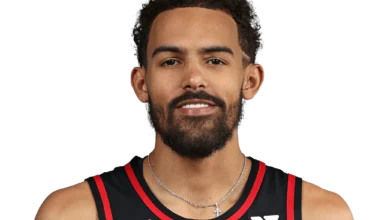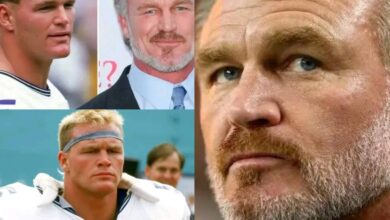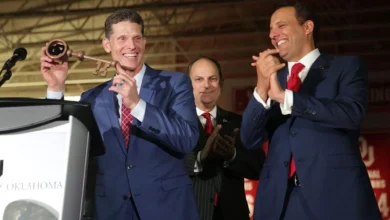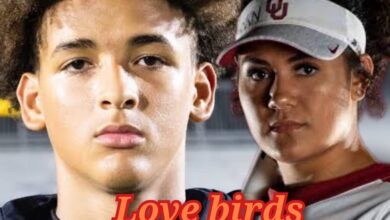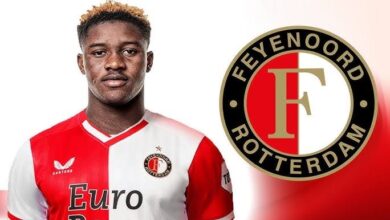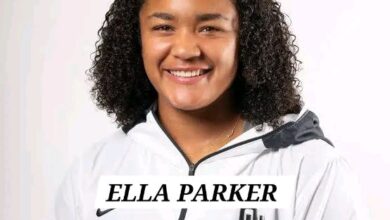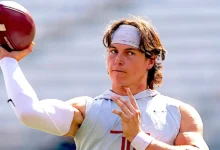3 – Star Cornerback Derrick Johnson Decommits and Recommits: Chooses Oklahoma in an…
3 - Star Cornerback Derrick Johnson Decommits and Recommits: Chooses Oklahoma in an...

3 – Star Cornerback Derrick Johnson Decommits and Recommits: Chooses Oklahoma in Impressive Fashion
In a move that’s generating plenty of buzz on the college football recruiting trail, three-star cornerback Derrick Johnson has officially recommitted to the University of Oklahoma, putting an end to weeks of speculation about his future. Johnson, a standout defensive back from Texas, initially backed off his OU pledge earlier this year, exploring other options before ultimately deciding that Norman was where he truly wanted to be.
This recommitment comes as a major win for the Sooners’ coaching staff, especially considering the highly competitive landscape of college football recruiting. With programs like Oklahoma State, Texas Tech, and even several SEC schools showing strong interest, Johnson’s return to Oklahoma’s 2025 recruiting class is a testament to the relationships built by head coach Brent Venables and his staff.
A Rollercoaster Recruitment
Johnson’s recruitment has been anything but straightforward. The 6-foot, 175-pound corner first committed to Oklahoma in late 2023, citing the program’s rich tradition, winning culture, and the opportunity to compete at a high level in the SEC. However, as his junior season progressed and his profile rose, more schools entered the mix, and Johnson began to second-guess his early decision.
By March 2024, Johnson officially decommitted from OU, stating he wanted to take a step back and reassess his options with a fresh perspective. That decision sparked a wave of interest, with several Power Five programs ramping up their pursuit. Oklahoma State, in particular, emerged as a serious contender. Johnson visited Stillwater twice this spring and was believed to be leaning toward Mike Gundy’s program.
But in a surprising twist, Johnson stunned fans and recruiting insiders alike by announcing on Sunday that he would be rejoining Oklahoma’s 2025 class.
A Show-Stopping Announcement
Rather than opting for a simple tweet or low-key video, Johnson made his decision in grand fashion. During a live-streamed event at his high school gym, surrounded by friends, family, and teammates, he pulled out a crimson OU cap and declared, “I’m coming home — Boomer Sooner!”
The crowd erupted with cheers as Johnson explained his decision. “At the end of the day, I had to trust my heart,” he said. “OU has always felt like home. The coaches never stopped believing in me, even after I stepped away. That meant everything.”
Johnson added that Oklahoma’s move to the SEC played a big role in his decision. “I want to compete against the best,” he said. “And I know I’ll get that chance at OU.”
What Johnson Brings to the Sooners
Ranked as a three-star recruit by most major services, Johnson may not have five-star hype, but he brings a level of skill and tenacity that should translate well to the next level. A natural playmaker with excellent instincts, he has a knack for reading quarterbacks and disrupting passing lanes. His speed and footwork allow him to stay with receivers in man coverage, while his toughness and tackling ability make him an asset in run support.
During his junior year, Johnson recorded four interceptions, 12 pass breakups, and 45 tackles, helping lead his team to the state semifinals. He’s expected to continue refining his technique during his senior season while preparing for early enrollment at Oklahoma next January.
OU cornerbacks coach Jay Valai had high praise for Johnson’s potential. “Derrick’s a competitor — plain and simple,” Valai said. “He plays with a chip on his shoulder, and that’s exactly the kind of edge we look for in our secondary. He’s going to be a great fit in our system.”
A Stronger 2025 Class
Johnson’s commitment strengthens what is shaping up to be a solid 2025 recruiting class for the Sooners. With several other highly touted defensive prospects already on board, Oklahoma continues to prioritize building a fast, physical defense capable of competing in the SEC.
Johnson’s flip also sends a message to other recruits: Oklahoma isn’t backing down in the race for elite talent.
Final Thoughts
In the world of college football recruiting, surprises are common — but few have the emotional weight and dramatic flair of Derrick Johnson’s return to the Sooners. His recommitment is more than just a win on the recruiting board; it’s a story of second chances, loyalty, and a young athlete’s belief in something bigger than himself. For Oklahoma fans, Sunday’s announcement was a reason to celebrate. And for Johnson, it marks the beginning of what could be a special chapter in his football journey.
Boomer Sooner — again.


